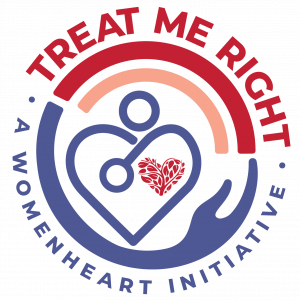WomenHeart Launches “Treat Me Right” A Groundbreaking Initiative to Empower Women and Advance Evidence-Based Heart Care
Why Treat Me Right Is Urgently Needed
Heart disease, the number one cause of death for women in the U.S., claims the lives of 1 in 5 women. Research and real-world outcomes show women face significant disparities in diagnosis and treatment compared to men:
Misdiagnosis and delayed diagnosis: Women are 50% more likely than men to receive an incorrect initial diagnosis after a heart attack, and misdiagnosis rates are 20–30% higher for women and minorities.
Worse outcomes: Women are often diagnosed later in disease progression, resulting in more severe illness and higher mortality. Women are 20% more likely than men to die within one year after a heart attack.
Undertreatment: Women are less likely than men to be referred to a cardiologist or specialist, prescribed life-saving medications, or receive critical heart procedures—even when guidelines recommend equal care.
Systemic bias: Gender biases contribute to misdiagnoses, with symptoms often dismissed or attributed to anxiety or stress.
Disproportionate impact: Black and Hispanic women, in particular, experience disproportionately poor outcomes due to systemic healthcare inequities.
Treat Me Right: A Bold Step Toward Patient-Centered Solutions
WomenHeart’s Treat Me Right is a multi-faceted, large-scale program that includes patients as empowered partners in their care.
“If we are serious about patient-centered care, we must include patients—especially women. Empowering women with knowledge and tools to get an accurate diagnosis and receive treatment aligned with evidence-based guidelines allows them to advocate for their health and ensures that disparities don’t continue unchecked,” said Celina Gorre, CEO of WomenHeart.
Treat Me Right has two main objectives:
Empower women to advocate for an accurate and timely diagnosis, reducing the incidence of missed, delayed, and misdiagnosis.
Promote treatment in accordance with clinical practice guidelines that support evidence-based heart care.
The end goal is to address gender and racial disparities in heart care through awareness, education, and systemic change.
Closing the Awareness Gap
According to the American Heart Association, only 13% of women consider heart disease their greatest personal health risk despite the fact that it kills more women than all forms of cancer combined. Awareness has declined in the past decade, particularly among younger women, Black women, and Hispanic women. Many women don’t recognize the signs of heart disease, and far too often, neither do their doctors. Symptoms may be subtle or atypical compared to men, leading to frequent misdiagnosis.
“It’s not ‘all in their head,’” said Dr. Padma Kaul, Ph.D., co-director of the Canadian VIGOUR Centre. “Confusion surrounding the unique signs of heart disease in
women, compounded by systemic issues, has created a crisis of misdiagnosis.”
Treatment to Clinical Practice Guidelines
Since 1980, the American College of Cardiology (ACC) and the American Heart Association (AHA) have published clinical practice guidelines to translate research into actionable, evidence-based recommendations. Studies show these guidelines improve patient outcomes, reduce unnecessary variation in care, and increase physician confidence, yet only 60% of care is aligned with these guidelines. Despite having the tools to standardize and improve treatment, there remains a major implementation gap—especially for women. In fact, a recent study found that only 22% of physicians and 42% of cardiologists felt “very well prepared” to treat heart disease in women.
Addressing Bias and Advocating for Equity
Gender bias remains a significant barrier. Women’s symptoms are more likely to be dismissed, downplayed, or misdiagnosed. When women do seek care, they often feel they are not listened to or believed and are sometimes even told their symptoms are “all in your head.” The Treat Me Right program aims to break this cycle by educating and empowering women to ask the right questions, understand their risks, and demand the care they deserve. This national initiative is made possible through the generous support of our sponsors: Alnylam, AstraZeneca, The Boehringer Ingelheim/Lilly Alliance, Bristol Myers Squibb, Cytokinetics, and Merck.
A Call to Action: It’s Time to Treat Women Right
The message is clear: Women deserve the right diagnoses and treatment right now. With Treat Me Right, WomenHeart is setting a new standard for what heart care for women should be: equitable, evidence-based, timely, and respectful.
About WomenHeart
WomenHeart: The National Coalition for Women with Heart Disease is a leading voice for the 60 million American women living with or at risk for heart disease. Since 1999, WomenHeart has been committed to advancing women’s heart health through patient support, education, and advocacy. With a nationwide network of trained patient Champions, WomenHeart empowers women to take charge of their heart health and works to eliminate disparities in cardiovascular care.
Jodi Smith
WomenHeart
+1 202-464-8780
email us here
Visit us on social media:
LinkedIn
Bluesky
Instagram
Facebook
YouTube
X
Legal Disclaimer:
EIN Presswire provides this news content "as is" without warranty of any kind. We do not accept any responsibility or liability for the accuracy, content, images, videos, licenses, completeness, legality, or reliability of the information contained in this article. If you have any complaints or copyright issues related to this article, kindly contact the author above.
Alfredo Del Mazo Maza: Mobility Is a Right, Not a Privilege
$45K in AI Educational Grants Now Open to High School and College Students
North America Backflow Preventer Market to Reach USD 194.30 Million by 2035 Amid Rising Water Safety Regulations
Kalendarium
Więcej ważnych informacji
 Jedynka Newserii
Jedynka Newserii

 Jedynka Newserii
Jedynka Newserii

Edukacja

Coraz więcej Polaków widzi korzyści płynące z obecności w UE. Co ósmy wciąż jednak nie potrafi ich wskazać
Członkostwo w UE cieszy się wśród Europejczyków rekordowo wysokim poparciem – wynika z tegorocznego Eurobarometru. Korzyści dla swojego kraju dostrzega 74 proc. obywateli Unii – to odsetek najlepszy od początku badań w 1983 roku. A w Polsce jest on jeszcze wyższy. Doceniamy przede wszystkim wkład UE w bezpieczeństwo, nowe możliwości zawodowe i rozwój gospodarczy kraju. Po 21 latach naszej obecności w UE wciąż jednak potrzebna jest europejska edukacja.
Polityka
Zmiany w obowiązku magazynowania gazu mogą obniżyć ceny surowca. To pomoże się przygotować do sezonu zimowego

Elastyczność bez zagrożenia dla bezpieczeństwa energetycznego – tak nową propozycję przepisów dotyczących uzupełniania zapasów gazu przed sezonem zimowym określają jej inicjatorzy z Parlamentu Europejskiego. Europosłowie proponują nieznaczne zmniejszenie wymaganego poziomu zapełnienia magazynów i rozciągnięcie w czasie terminu, w którym trzeba spełnić ten obowiązek. Jak podkreśla Borys Budka, ma to zapobiec spekulacjom na rynku gazu i tym samym pomóc obniżyć ceny surowca.
Konsument
Możliwość zakupu online może zachęcić kolejne grupy Polaków do ubezpieczeń zdrowotnych. Dziś korzysta z nich już prawie 5,5 mln osób

Polska jest jednym z liderów Europy w obszarze cyfryzacji sektora usług medycznych. Świadczą o tym m.in. popularność elektronicznych narzędzi zapewniających dostęp do danych zdrowotnych, e-recept czy wirtualna diagnostyka. Polacy są też otwarci na innowacje w zakresie ubezpieczeń zdrowotnych, z których korzysta już blisko 5,5 mln osób. Za pomocą nowej cyfrowej platformy Medicover chce zachęcić klientów do samodzielnej konfiguracji i zakupu polis online.
Partner serwisu
Szkolenia

Akademia Newserii
Akademia Newserii to projekt, w ramach którego najlepsi polscy dziennikarze biznesowi, giełdowi oraz lifestylowi, a także szkoleniowcy z wieloletnim doświadczeniem dzielą się swoją wiedzą nt. pracy z mediami.









.gif)

 |
| |
| |
|